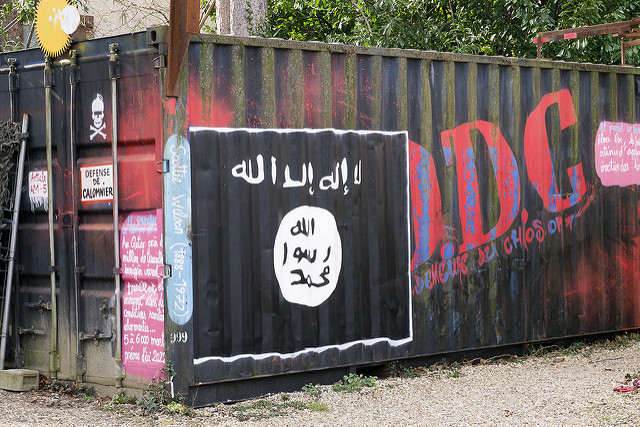
Last week witnessed a milestone in Australia’s fight against terrorism when Hamdi al Qudsi was sentenced to prison for eight years, with a non-parole minimum of six, for facilitating foreign fighter travel from Australia to Syria. The court case provides rare insight into the mechanics of recruitment and facilitation, and the fear experienced by those who travelled to fight in the Middle East.
Al Qudsi was part of a Sydney-based group responsible for sending many Australians to fight with Jabhat al-Nusra and later the Islamic State group in the Syrian conflict. He was the first person to be charged (in December 2013) and convicted for supporting engagement in armed hostilities in Syria. Together with Mohamed Ali Baryalei and other petty criminals from the Sydney ‘Street Dawah’ group, they cajoled and provided the logistics to send at least 30 young Australians to take part in terrorist actions in the Middle East. Their clients included notorious terrorists Khaled Sharrouf and Mohamed Elomar. Australia has been disproportionately represented amongst the foreign fighter cohort in the Middle East, due in large part to recruiters such as al Qudsi and Baryalei.
Prosecution evidence in the al Qudsi case included 300-plus telephone intercepts between him and others in the group. The intercepted calls and texts illustrate the critical role of recruiters. We’re now used to propaganda highlighting the ‘personal’ path to extremism from the likes of Jake Bilardi and ‘Ginger Jihadi’ Abdullah Elmir, and the atrocities committed once in the conflict zone by people such as Khaled Sharrouf and Mohamed Elomar. Less visible, however, are the nitty-gritty of administration and logistics required to travel from Australia’s suburbs to a Middle Eastern conflict zone and the traumatic reality that greets the naïve wannabe fighter from Australia.
Propaganda and armchair jihadism alone aren’t enough to push a teenager to travel thousands of kilometres to live in a barbaric rendition of the Islamic caliphate, let alone travel to blow themselves up, as Bilardi did. That’s where facilitators like Hamdi al Qudsi come in. In dozens of phone calls Al Qudsi can be heard telling his sometimes questioning and doubtful young recruits to stop listening to other authorities—such as parents. Cutting off alternative views provides the ‘echo chamber’ effect used by Islamist extremists worldwide. Examples are two exchanges with Mehmet Biber, before and after his parents found out about his plans to travel to Syria to fight:
BIBER: Like my heart is very clear. I’m not worrying about my parents anymore. I’m not worrying about nothing.
AL-QUDSI: …keep me posted okay, with every step that you guys make.
BIBER: … my parents, my mum and dad, they are causing big hardships for me and my wife.
AL-QUDSI: … this is the price, this is the price.
Many of the discussions highlight the administrative detail of the logistics of getting to Syria: financing travel, booking airline tickets, avoiding security, and moving across the volatile Turkey–Syria border. ATM withdrawals on the Turkish side are recommended. Here, al Qudsi is shown to be the intermediary for the shadowy funds making it all happen.
Unemployed? Al Qudsi will arrange funds for your trip. Never been overseas? Don’t worry – al Qudsi will tell you what visa you need, and maybe provide a false identity. Baryalei will meet you in Turkey and get you across the border. Upset your husband has left for Syria without telling you? Al Qudsi promises a ‘nice new car’ to help you get over it, as he did with Tyler Casey’s wife, Amira Karroum.
But persuading young Sydney-siders to go to Syria was only part of the story. One of the most fascinating insights from the intercepts is what they show of the so-called ‘caliphate’. The recruits typically don’t like what they find when they arrive.
There’s surprise and disappointment that they have to work, and that they aren’t treated as important. There’s fear of being shot at, and gradual realisation that they’re in a warzone with no military or even life skills. When Baryalei expressed concern that the recruits want to go home al Qudsi bemoaned them as ‘children’.
Of the seven would-be fighters al Qudsi was found guilty of supporting, two succeeded in going home, including Biber. Two more were killed and the fate of a further two remains unknown. The seventh was prevented from leaving by Australian authorities.
Baryalei’s notoriety as a so-called Islamist ‘hero’ is also dealt a blow, with the intercepts showing that once in the conflict area he, too, was afraid, and scared of crossing the border, referring to a ‘sniper’ (likely just someone trained in using a rifle, rather than an expert marksman). From the comfort of Sydney, al Qudsi turned the ‘echo chamber’ on Baryalei, keeping him focused on the ‘cause’. Baryalei was dead a year later.
It’s taken two and a half years for al Qudsi’s case to come to court; a timeframe that parallels the rise and fall of Daesh in the Middle East. The matter has, however, done much more than bring a criminal to justice: it has exposed in its own words, and in detail, the hollowness of the Islamist cause.

